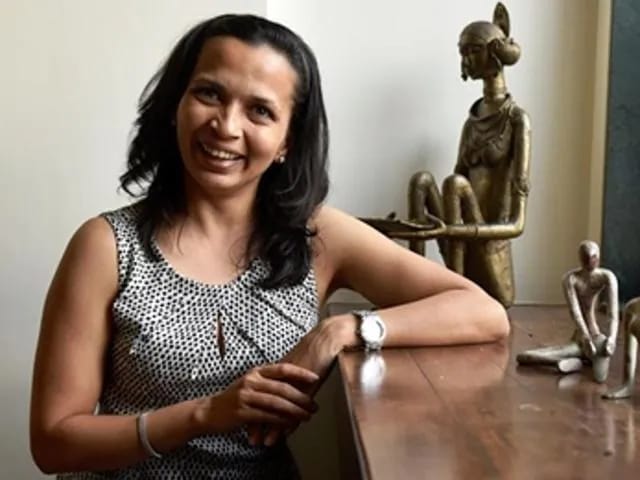Read this news of Hindustan Times…..
In her new book, celebrity nutritionist and author Rujuta Diwekar tells you why you should not skip items usually considered strict no-nos when you are on a diet
Nutritionist to celebrities such as Kareena Kapoor Khan (she helped her turn ‘size zero’ for Tashan, 2008), Alia Bhatt and Varun Dhawan, Diwekar was one of the first Indian bloggers on the scene. She started Rujuta’s Gyan (rujutadiwekar.blogspot.in) in 2008, and wrote about her take on health, dieting and food. With bestsellers like Don’t Lose Your Mind, Lose Your Weight (2009) and Women and the Weight Loss Tamasha (2010) behind her, she is now out with a fourth book — Indian Superfoods.
Much like her other works, this book, too, champions the idea of eating foods you are familiar with but consider unhealthy. Think rice, ghee, sugar and cashews. What’s the catch? You need to eat it fresh, locally sourced and in the “versatility it is meant to be eaten in”. And exercising and sleeping right, meanwhile, are non-negotiable, of course.
Back to basics
The foundations of this philosophy were laid during Diwekar’s childhood when she would visit her grandparents’ farm in Sonave (a village in Palghar district, Maharashtra). “All my vacations would be spent there. My cousins and I would help grow and harvest the crops. That was our entertainment, and a tool for learning,” she recalls.
Diwekar started her practice in 1999, armed with a post graduate degree in sports science and nutrition from SNDT College. Her first clients were fitness conscious actors and industrialists. Diwekar remains full of praise for the former: “The easiest people to work with are celebrities. They are the most disciplined.”
It was her experience at her grandparents’ farm that made Diwekar realise the importance of sustainable living. “Today, we are told about a particular ingredient that’s supposed to be the ultimate thing to lose weight. Tomorrow, the same ingredient is touted as the biggest villain. How often can you change the way you live?” she asks.
Instead, Diwekar advocates that we follow our grandmothers’ wisdom, and not be swayed by modern trends like stocking up on quinoa and kale — the two biggest trends internationally in recent times. “Quinoa doesn’t sit well in your stomach nor does it blend with anything. And until two years ago, we didn’t even know what kale was. Now, we have it in every form. We are copying the poor man’s food from a different continent. There is such diversity in the food of our own country — grains, legumes, pulses — but are overlooking it.”
So, how did the definition of nutrition become synonymous to filling your plate with unpalatable foods? When did we became a nation that rejects ghee but takes to olive oil? “The demarcation of carbohydrates, proteins and fats was meant to help people make sensible decisions. But it has just left people confused. These days, selling anything by terming it ‘transfat-free’ or ‘sugar-free’ is lucrative. The only people benefitting are those in the food and weight-loss industries,” she says.
But telling people that the global ‘health’ foods fads they’ve bought into are unnecessary must be tricky. Diwekar, on the other hand, says people are relieved. “They are reminded of the time in school or college when they would eat everything, and still be healthy.”
The next round
Aiming for a holistic view on life, Diwekar started Beyond Weight Loss — a series of programs targeted at overall well-being — early this year. As part of it, she hosts a talk at her Khar office every month. The talk is live-streamed on Facebook as well. Past events have included a dhrupad music concert and a financial talk on why women should invest.
Diwekar is also working on a book on child obesity. Another project that she is keen on is the Sonave Community Farming Project, where she takes Mumbaikars to her ancestral farm to grow their own food. The idea is to raise awareness about the goodness of Indian food and ensure it doesn’t come back repackaged from the west. “We should not wait for the West to acknowledge it as something of value. A diet that is not culturally compliant is a diet that won’t last beyond two meals. Why is killing yourself at a gym and starving a better idea than giving food we grew up eating a chance?”credit Hindustan Times
Aapka Saath – What is your opinion about these news? Tell us by writing in the comment box on Facebook. Like our Facebook page to see the latest news and videos from city to country. Click here to subscribe to our news channel.
Follow us on Facebook http://facebook.com/HamaraGhaziabad
Follow us on Twitter http://twitter.com/HamaraGhaziabad
